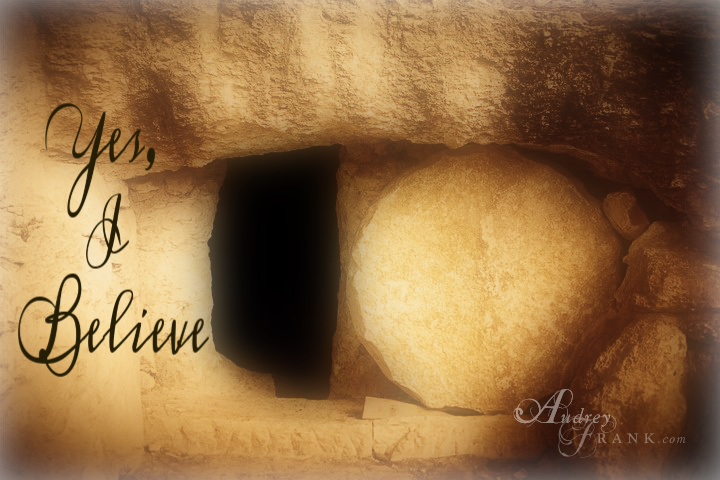If You Had Been Here: A Resurrection Story

@audreycfrank
When Mary reached the place where Jesus was and saw him, she fell at his feet and said, “Lord, if you had been here, my brother would not have died” (John 11:32).
This is Mary, the one who knew she was loved by the Lord. Mary, the one who sat at his feet and listened. She was the woman who broke the cultural stereotype of the day that said women could not be students, disciples of the Rabbi. Mary is the one who “chose the thing that was better” (see Luke 10:42). One day this same Mary would anoint Jesus’ feet with expensive perfume before his crucifixion (see John 12:1-8).
Mary had a strong measure of confidence in her relationship with Jesus. She knew him and trusted him. She thought she understood him.
But He let her down.
Have you ever waited on the Lord, knowing Him, trusting Him, believing He would come and rescue you or a loved one… yet He did not come?
Have you ever been let down by Jesus? You thought you understood Him, and now in the aftermath of sorrow, you slump, utterly confused and bewildered.
There is hope,
Jesus is on His way to you, and His absence is not an absence at all. It is simply a delay. New life is about to emerge in ways your heart and mind cannot fathom.
This is a hard saying in the face of death.
Death is death. It is an ending. With the finality of a door slamming, death’s locks latch into place with a deafening snap, taking the one we love beyond our reach. Gasping for breath we press on the door, desperately trying to touch one more time. To hear that voice once more. Even with the hope of heaven, death can seem an empty silence that leaves us immobilized, wondering if we will survive.
Mary and Martha watched as Lazarus slipped away. Sitting beside a loved one as he battles critical illness is excruciating. Lazarus was likely Mary and Martha’s caregiver, their protector, their provider. There is no mention of parents, and we might assume Lazarus had taken the role of his father in caring for his two unmarried sisters, as was the custom of the time. Mary and Martha loved Lazarus and depended on him.
They watched helplessly as Lazarus grew worse and sent word to Jesus that he was dying. But rather than coming immediately, Jesus remained where He was two more days (11:6). Shortly thereafter, Lazarus died.
Mary shrank into the shadows, not only grieving the loss of her brother but the loss of her confidence in Jesus.
Martha most likely did what she is known for: she kept busy with all the things that had to be done.
After several days, when she heard Jesus was finally on his way to their house, Martha went out to meet him, exclaiming, “Lord, if you had been here, my brother would not have died” (11:21).
If you had been here.
The sisters must have been lamenting Jesus’ absence with those words. If Jesus had been here…
The phrase was imprinted upon their hearts and was the first thing that tumbled from their lips when they saw him.
But Martha added something to her backhanded rebuke of the Savior: “But I know that even now God will give you whatever you ask” (11:22).
Maybe all those days in the kitchen Martha was eavesdropping as her sister Mary sat learning at Jesus’ feet. Faith was budding in her, and even couched in a reprimand it radiated promise and hope.
Jesus’ response is jaw-dropping, a startling teaser for what was to come a very short time later.
Jesus said to her, “Your brother will rise again.”
Martha answered, “I know he will rise again in the resurrection at the last day” (v.23-24).
At the beginning of this exchange, Martha is focused on her brother. Flooded with grief, all she wants from Jesus is what he can do for her and her family. I want my brother back and I believe God will do it for you if you ask Him.
Jesus is a secondary player in the scene, important because of what help He might bring to rectify the tragic situation.
Jesus said to her, “I am the resurrection and the life. He who believes in me will live, even though he dies; and whoever lives and believes in me will never die. Do you believe this?” (v. 25-26).
Like a seismic shift in the earth’s surface during an earthquake, Jesus’ response changes the very foundation of their conversation. The core question has changed. It is no longer, “Will Jesus resurrect Lazarus?” Instead, it becomes, “Is Jesus the resurrection?”
In an instant Jesus reveals the heart of the matter for every person paralyzed by grief and disappointment in God.
“Do you believe this?”
“Yes, Lord,” she told him, “I believe that you are the Christ, the Son of God, who was to come into the world” (v. 26-27)
The heart of the matter is belief. Do we believe Jesus is the resurrection and the life? If we do, even death changes. The most desolate situation is transformed and the air
Poor Martha gets a bad rap. She is often the target of spiritual jokes, the one with too much work to do to sit at Jesus’ feet, the bad sister who put busyness before discipleship. But at this moment, she shines.
Yes, Lord. I believe.
She understood immediately what she must do next. Running to her sister Mary, she gently persuaded her to come out of hiding and talk to Jesus.
Earlier when Martha went out to meet Jesus on the road, Mary simply couldn’t bring herself to join her sister. She was not one for choosing the right behavior for propriety’s sake. Mary lived and acted with raw honesty. She was too hurt to be cordial to the one who’d had the power to save her brother and didn’t. But now, with Martha’s help, she bravely went out to face him with the same words her sister had used moments earlier.
If you had been here, my brother would not have died.
Unlike Martha, honest, broken Mary did not add a statement of faith to her reproach. She let her ragged words hang in the air, heavy with sorrow and disappointment. It is okay to do that.
It is okay to be a Martha or a Mary. Jesus loves both and He is at work to heal and redeem every broken heart.
When Jesus saw Mary weeping, He was deeply moved in spirit and troubled (11:33). Many theologians agree that in this passage Jesus is not merely troubled because His loved ones are grieving. Jesus is deeply moved in spirit because death, the consequence of Original Sin, was never intended by the loving Creator. God created people to live forever in fellowship with Him.
Jesus was grieving for Mary, Martha,
In this story, Jesus is like the generous benefactor who, when asked by a poor man for help with a house payment, bought the house and all the land surrounding it and gave the deed to the man. Martha and Mary asked for resurrection for their brother, and Jesus gave resurrection for every person who would believe in Him. Jesus gave all He had to give: He gave Himself.
When we trust Jesus beyond our disappointment, beyond our understanding of His ways, we make room in our hearts for His astonishing work of resurrection. He is good, and He loves us. The Messiah is for us, and He is working on our behalf. May we say like Martha, “Yes, Lord. I believe.”
Lord, help my unbelief even when I am frozen in grief and disappointment. Bring resurrection in my life. Amen.

No Comments